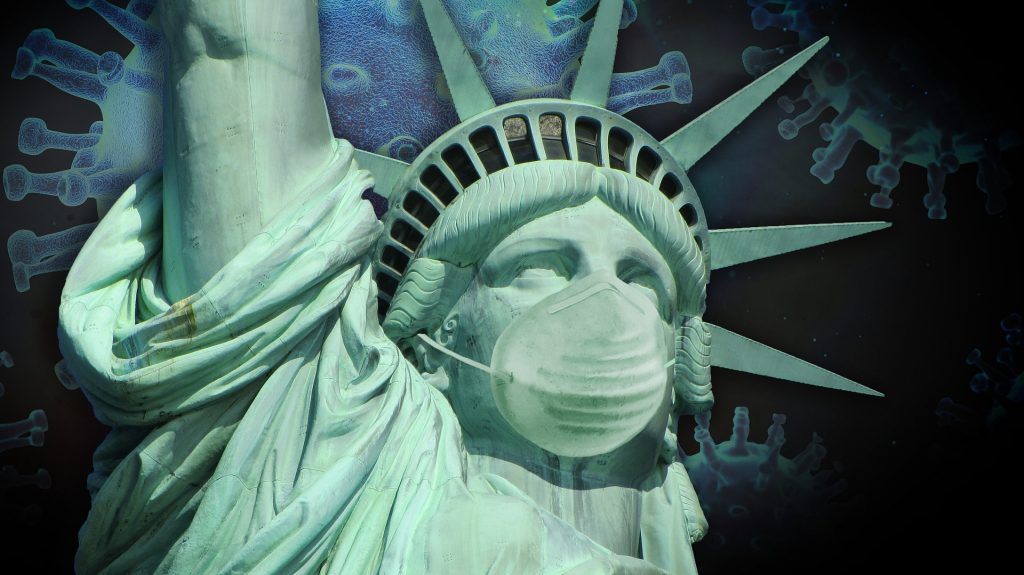COVID-19 (the novel coronavirus) has had a major impact on all countries across the globe. One of the hardest-hit countries has to be the United States of America. With upwards of 200,000 new cases daily, there’s no doubt the U.S. response to coronavirus is very different from that of other countries. A major part of the problem can be attributed to the governing bodies of America. Donald Trump, the former president, has been ridiculed over his handling of the virus. In the early days of the pandemic, Donald Trump is on record stating that America is “safe” and that the coronavirus is nothing to be worried about. Later, he admitted that the coronavirus reached devastating levels throughout the country. There was even an election held in 2020, where Donald Trump was voted out of office. Joe Biden is now awaiting his term to commence. America watches on to see how Biden will handle the pandemic. Hundreds of thousands of deaths have already resulted from the virus, with the elderly and immunocompromised most at risk.
While other countries have reacted quickly by going into a strict lockdown to protect their citizens, the U.S. has had some unclear and uneven rules surrounding lockdowns. With a lack of clear direction from the President, many states across the U.S. have enforced their own form of lockdown on their citizens. These range from limiting service in bars and restaurants across Illinois, to stay-at-home orders in California. Some of these lockdowns only remained in place for a few days, effectively rendering them meaningless in the long-run battle against coronavirus. The spread of the virus across the country isn’t slowing down yet, with 250,000 new cases recorded earlier in the week. The death toll is also growing rapidly: 282,000 at last count. All of these ill patients are putting great strain on the medical system and hospitals across the country.

Hospitals across the U.S. are being inundated with coronavirus patients, causing some to be turned away with instructions to self-isolate in their homes. This is causing issues with regards to access to medical equipment. Many older patients are having to turn to health equipment rentals in order to receive the treatment they need. Of course, the rental of this equipment can incur high costs, including deposits, the upfront price and the electricity required to power them. Some pieces of equipment also require extra attachments such as air compressors in order to get them working. This is putting a significant financial strain on patients who are already suffering from the virus.
It’s not just the hospitals that are struggling to cope during the pandemic. Many small businesses are finding it tough to keep their doors open. Some are struggling with staffing due to their workers falling ill, while others are struggling financially due to the public’s hesitance to visit their establishment. Some companies have even had to close their doors temporarily, with no set reopening date. America isn’t the only place where this has happened, though. In Australia, for example, restaurants and bars across entire states were forced to close their doors as dining out was prohibited under lockdown restrictions. In fact, almost every business in Australia was impacted by coronavirus in some way. Whether it was a drop in sales for air compressor parts or a decline in services required from online printing services in Australia, everyone had to adapt their businesses to fit into a new COVID-impacted world.
Education surrounding coronavirus has been an important factor across the globe, including the U.S. We have seen brochures handed out in doctor’s clinics, billboards go up on the side of highways, and advertisements on television with regards to maintaining good hygiene. This has meant some good news for a select number of companies in the U.S., as those who are capable of brochure printing and billboard installation are gaining extra work. This education is vital for the public to become aware of their actions and impacts on stopping the spread of coronavirus. While general education has been important for the general public, more specialised training has also been important for those dealing with coronavirus patients.
Doctors and nurses have had to adapt quickly to the toll that coronavirus is having on patients. The U.S. has had thousands of medical professionals on the front line throughout the pandemic, many of whom were required to update their training with regards to infection control procedures in hospitals. This training has paid off, though, with doctors and nurses feeling more confident to tackle the virus than they were just a few months ago. Nurses have been photographed in full HAZMAT suits when treating infected patients in order to stop the virus from spreading throughout the hospital to other, non-coronavirus related patients. They have also learnt to diagnose and treat patients virtually, meaning those who are infected don’t have to leave home until their quarantine period is over. Strict hygiene and sanitation practices have been put in place for patients and staff in hospitals and clinics, including the use of disposable face masks while in the hospital building.
The U.S., like many countries around the world, has been battling the Coronavirus pandemic for the most of 2020. While the U.S. is lagging behind other countries with regards to reducing coronavirus numbers and slowing the death toll, other countries have succeeded in lowering numbers enough to ease lockdown restrictions. Some states and countries have even been declared COVID-free. The U.S. still has a long way to go in their response to coronavirus – enforcing lockdowns and limiting the population’s movement will be key to getting the case numbers and death toll under control. Coronavirus is a nasty beast that must be conquered, as continuing the way the U.S. has over 2020 will result in far too many deaths going into 2021, and nobody wants that. It is time for the U.S. to take other countries by example and come up with a solid plan to lower coronavirus numbers and protect its citizens.






